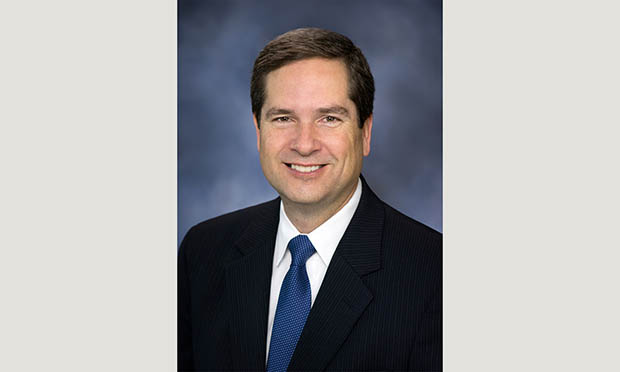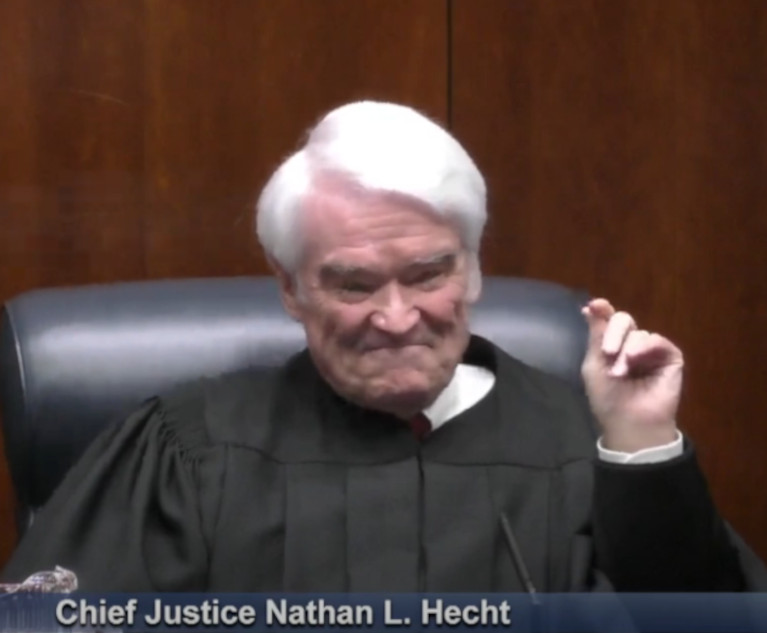The Mental Challenges Judges Face
"As lawyers we have to realize judges are people and are impacted by the weight of the cases they decide, particularly when paired with problems they may experience in their lives off the bench," writes Butler Snow partner Scott K. Field.
February 27, 2020 at 06:11 PM
6 minute read
 Scott K. Field is a partner with Butler Snow in Austin. (Courtesy Photo)
Scott K. Field is a partner with Butler Snow in Austin. (Courtesy Photo)
Isolation isn't healthy for anyone. That's especially true for those who serve in the judiciary.
Serving as a judge is a unique experience. In Texas, where judges are selected in the general election on a partisan ballot, judges must campaign for their jobs. Campaigning is a whirlwind of activity and experiences, both positive and negative. But there is one constant in any good political campaign—the candidate is constantly surrounded by people. Then, if the campaign goes well and the judge is elected, he or she takes the bench and is surrounded only by litigants who need difficult questions answered. And, for appellate judges, they don't even see the litigants; their only daily interaction is with their colleagues and court staff. For the judge, life gets quiet—sometimes too quiet.
When I became a Justice on the Third Court of Appeals, I instantly loved the job and felt well-suited for it. But I did not fully appreciate some of the challenges of the job and how to combat them. At one point early in my term, I realized I had allowed myself to become isolated, physically and emotionally. This isolation led me down a dark hole due to a combination of challenges in my personal life combined with a set of particularly troubling cases I had reviewed consecutively. This combination, which is detailed in an article I wrote for the Austin Lawyer, was a dangerous cocktail. The world felt like an evil, dark place. And, perhaps most alarming in retrospect, I didn't realize how it was affecting me until someone close to me pointed out how I had become quiet and grumpy, which was different than my normal demeanor.
When I wrote about these experiences in the February issue of the Austin Lawyer, I was not comfortable about sharing them. What if I was the only one who had that type of experience while on the bench? Would I appear weak for sharing my experiences? Would anyone be helped by my words? Since then, the article was shared and reshared on social media, and the response from judges has been overwhelming. I have received notes, emails, texts and calls from a variety of judges around the country, state and federal, trial and appellate. My takeaway from these notes is simple—this type of experience while on the bench is all too common.
A small, anonymous sampling of these notes includes the following:
- "It's nice to know I'm not alone in some of the sentiments you expressed."
- "I just wrapped up a long termination case that kicked me in the gut and left me in the dumps."
- "[Your article] was an epiphany for a young judge like myself who often finds himself isolated and disconnected from fellow practitioners. Your article has given me the encouragement to start reaching out."
These comments and others confirmed that this problem is more widespread than most realize.
At about the same time, I became aware of the "National Judicial Stress and Resilience Survey," a survey by the American Bar Association of judges about issues relating to stress and wellness.
In the survey, over 20% of responding judges reported fatigue, sleep disturbance, interference with attention and concentration, worry about cases after making decisions, feelings of apprehension and anxiety, and irritability. Each of these responses is a sign of emotional struggle. Over 2% of judges reported thoughts of suicide or injuring themselves. And those were just the ones who responded and were honest about their experiences.
So, what are we to do with this information? Judging is hard, but each person signs up for the job voluntarily. We are not to pity judges or make excuses for uneven temperaments from the bench. But as lawyers we have to realize judges are people and are impacted by the weight of the cases they decide, particularly when paired with problems they may experience in their lives off the bench. I am no psychologist, but I have to believe these symptoms reported by judges are, at least to some degree, caused by the isolation of the job. With that in mind, here are a few helpful tips for judges and lawyers in dealing with this issue.
Judges, recognize the dangers of isolating yourself from your family, friends and those in the legal community. Schedule lunches. Attend bar events. Take care of yourself. And, to the extent you can, recognize when a particular case is having a negative effect on your emotions and demeanor and step away from it if you can, even for a short time. And, try to mix in some cases that are more mundane or less emotionally taxing with the difficult ones.
Lawyers, act with civility in the courtroom, but also treat judges with kindness when you see them outside the courtroom. Most judges would enjoy having a conversation about something other than law and to be treated like a normal individual. This is why those who were friends with the judge before he or she took the bench are particularly important. Those persons and the judge's family can relate to the judge simply as a civilian and not one from whom they can expect a ruling soon. This type of personal connection and normalcy is critically important for a judge.
Judges are people, just like you and me. They have personal problems, just like anyone else. But they also serve in a job that naturally isolates them while making important decisions that impact people's lives. It's a recipe that can take down even the strongest of individuals. As lawyers, one of our roles is to help them. By doing so, we not only make the justice system better, but we also help a fellow lawyer who happens to wear a robe while at work.
Scott K. Field is a partner with Butler Snow where he practices in the firm's commercial litigation practice group with a focus on appellate advocacy. He also serves as an arbitrator and mediator. Before joining the firm, Field served for six years as a Justice on the Third Court of Appeals in Austin.
This content has been archived. It is available through our partners, LexisNexis® and Bloomberg Law.
To view this content, please continue to their sites.
Not a Lexis Subscriber?
Subscribe Now
Not a Bloomberg Law Subscriber?
Subscribe Now
NOT FOR REPRINT
© 2025 ALM Global, LLC, All Rights Reserved. Request academic re-use from www.copyright.com. All other uses, submit a request to [email protected]. For more information visit Asset & Logo Licensing.
You Might Like
View All
ExxonMobil Sues California AG Bonta, Environmental Groups for Advanced Recycling 'Smear Campaign'

2 Judges: Meet the New Chief Justice and the GC Who Just Rose to the Bench
3 minute read

Law Firms Mentioned
Trending Stories
- 1'It's Not Going to Be Pretty': PayPal, Capital One Face Novel Class Actions Over 'Poaching' Commissions Owed Influencers
- 211th Circuit Rejects Trump's Emergency Request as DOJ Prepares to Release Special Counsel's Final Report
- 3Supreme Court Takes Up Challenge to ACA Task Force
- 4'Tragedy of Unspeakable Proportions:' Could Edison, DWP, Face Lawsuits Over LA Wildfires?
- 5Meta Pulls Plug on DEI Programs
Who Got The Work
Michael G. Bongiorno, Andrew Scott Dulberg and Elizabeth E. Driscoll from Wilmer Cutler Pickering Hale and Dorr have stepped in to represent Symbotic Inc., an A.I.-enabled technology platform that focuses on increasing supply chain efficiency, and other defendants in a pending shareholder derivative lawsuit. The case, filed Oct. 2 in Massachusetts District Court by the Brown Law Firm on behalf of Stephen Austen, accuses certain officers and directors of misleading investors in regard to Symbotic's potential for margin growth by failing to disclose that the company was not equipped to timely deploy its systems or manage expenses through project delays. The case, assigned to U.S. District Judge Nathaniel M. Gorton, is 1:24-cv-12522, Austen v. Cohen et al.
Who Got The Work
Edmund Polubinski and Marie Killmond of Davis Polk & Wardwell have entered appearances for data platform software development company MongoDB and other defendants in a pending shareholder derivative lawsuit. The action, filed Oct. 7 in New York Southern District Court by the Brown Law Firm, accuses the company's directors and/or officers of falsely expressing confidence in the company’s restructuring of its sales incentive plan and downplaying the severity of decreases in its upfront commitments. The case is 1:24-cv-07594, Roy v. Ittycheria et al.
Who Got The Work
Amy O. Bruchs and Kurt F. Ellison of Michael Best & Friedrich have entered appearances for Epic Systems Corp. in a pending employment discrimination lawsuit. The suit was filed Sept. 7 in Wisconsin Western District Court by Levine Eisberner LLC and Siri & Glimstad on behalf of a project manager who claims that he was wrongfully terminated after applying for a religious exemption to the defendant's COVID-19 vaccine mandate. The case, assigned to U.S. Magistrate Judge Anita Marie Boor, is 3:24-cv-00630, Secker, Nathan v. Epic Systems Corporation.
Who Got The Work
David X. Sullivan, Thomas J. Finn and Gregory A. Hall from McCarter & English have entered appearances for Sunrun Installation Services in a pending civil rights lawsuit. The complaint was filed Sept. 4 in Connecticut District Court by attorney Robert M. Berke on behalf of former employee George Edward Steins, who was arrested and charged with employing an unregistered home improvement salesperson. The complaint alleges that had Sunrun informed the Connecticut Department of Consumer Protection that the plaintiff's employment had ended in 2017 and that he no longer held Sunrun's home improvement contractor license, he would not have been hit with charges, which were dismissed in May 2024. The case, assigned to U.S. District Judge Jeffrey A. Meyer, is 3:24-cv-01423, Steins v. Sunrun, Inc. et al.
Who Got The Work
Greenberg Traurig shareholder Joshua L. Raskin has entered an appearance for boohoo.com UK Ltd. in a pending patent infringement lawsuit. The suit, filed Sept. 3 in Texas Eastern District Court by Rozier Hardt McDonough on behalf of Alto Dynamics, asserts five patents related to an online shopping platform. The case, assigned to U.S. District Judge Rodney Gilstrap, is 2:24-cv-00719, Alto Dynamics, LLC v. boohoo.com UK Limited.
Featured Firms
Law Offices of Gary Martin Hays & Associates, P.C.
(470) 294-1674
Law Offices of Mark E. Salomone
(857) 444-6468
Smith & Hassler
(713) 739-1250






